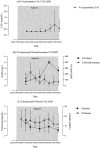Assessment of Fasting Metabolism With Microdialysis Indicates Earlier Lipolysis in Children With VLCADD Than MCADD
- PMID: 39837805
- PMCID: PMC12066911
- DOI: 10.1111/apa.17591
Assessment of Fasting Metabolism With Microdialysis Indicates Earlier Lipolysis in Children With VLCADD Than MCADD
Abstract
Aim: To investigate fasting metabolism in children with very long-chain acyl-CoA dehydrogenase deficiency (VLCADD) and medium-chain acyl-CoA dehydrogenase deficiency (MCADD) using microdialysis technique.
Methods: Twelve patients (7 with VLCADD, 5 with MCADD, mean age 4.9 years, 10/12 diagnosed via newborn screening) were recruited for investigation in connection to clinical fasting examinations at the Karolinska University Hospital (between 2015 and 2024). Patients were subjected to a 9-h night fast after a standard late evening meal. Analysis of glucose, glycerol, lactate, and pyruvate was conducted by continuous microdialysis. Fasting hormones and acylcarnitines were analysed in blood samples at 1-h intervals in patients with VLCADD.
Results: Children with VLCADD showed signs of lipolysis after a median fasting time of 4.5 h, whereas patients with MCADD showed no significant increase in lipolysis during the fast. A shorter time to initiation of lipolysis tended to correlate with a lower residual enzyme activity in patients with VLCADD. All patients maintained euglycemia during fasting.
Conclusion: Children with VLCADD had a shorter time to initiation of lipolysis during fasting than children with MCADD. Clinical evaluation of fasting metabolism in beta-oxidation disorders should include assessment of lipolysis as an early and important determinant.
Keywords: Beta‐oxidation disorders; MCADD; VLCADD; fasting intolerance; microdialysis.
© 2025 The Author(s). Acta Paediatrica published by John Wiley & Sons Ltd on behalf of Foundation Acta Paediatrica.
Conflict of interest statement
The authors declare no conflicts of interest.
Figures
Similar articles
-
Proposal for an individualized dietary strategy in patients with very long-chain acyl-CoA dehydrogenase deficiency.J Inherit Metab Dis. 2019 Jan;42(1):159-168. doi: 10.1002/jimd.12037. J Inherit Metab Dis. 2019. PMID: 30740737
-
Lipidome plasticity in medium- and long-chain fatty acid oxidation disorders: Insights from dried blood spot lipidomics.Biochim Biophys Acta Mol Cell Biol Lipids. 2025 Jun;1870(5):159621. doi: 10.1016/j.bbalip.2025.159621. Epub 2025 May 1. Biochim Biophys Acta Mol Cell Biol Lipids. 2025. PMID: 40318842
-
Non-invasive test using palmitate in patients with suspected fatty acid oxidation defects: disease-specific acylcarnitine patterns can help to establish the diagnosis.Orphanet J Rare Dis. 2017 Dec 21;12(1):187. doi: 10.1186/s13023-017-0737-7. Orphanet J Rare Dis. 2017. PMID: 29268767 Free PMC article.
-
The Pathogenesis of Very Long-Chain Acyl-CoA Dehydrogenase Deficiency.Biomolecules. 2025 Mar 14;15(3):416. doi: 10.3390/biom15030416. Biomolecules. 2025. PMID: 40149952 Free PMC article. Review.
-
Newborn screening for medium chain acyl-CoA dehydrogenase deficiency (MCADD) in the UK.J Fam Health Care. 2004;14(4):90-2. J Fam Health Care. 2004. PMID: 15453442 Review.
References
-
- Miller M. J., Cusmano‐Ozog K., Oglesbee D., Young S., and Committee A. L. Q. A., “Laboratory Analysis of Acylcarnitines, 2020 Update: A Technical Standard of the American College of Medical Genetics and Genomics (ACMG),” Genetics in Medicine 23, no. 2 (2021): 249–258, 10.1038/s41436-020-00990-1. - DOI - PubMed
MeSH terms
Substances
Supplementary concepts
Grants and funding
LinkOut - more resources
Full Text Sources
Medical




